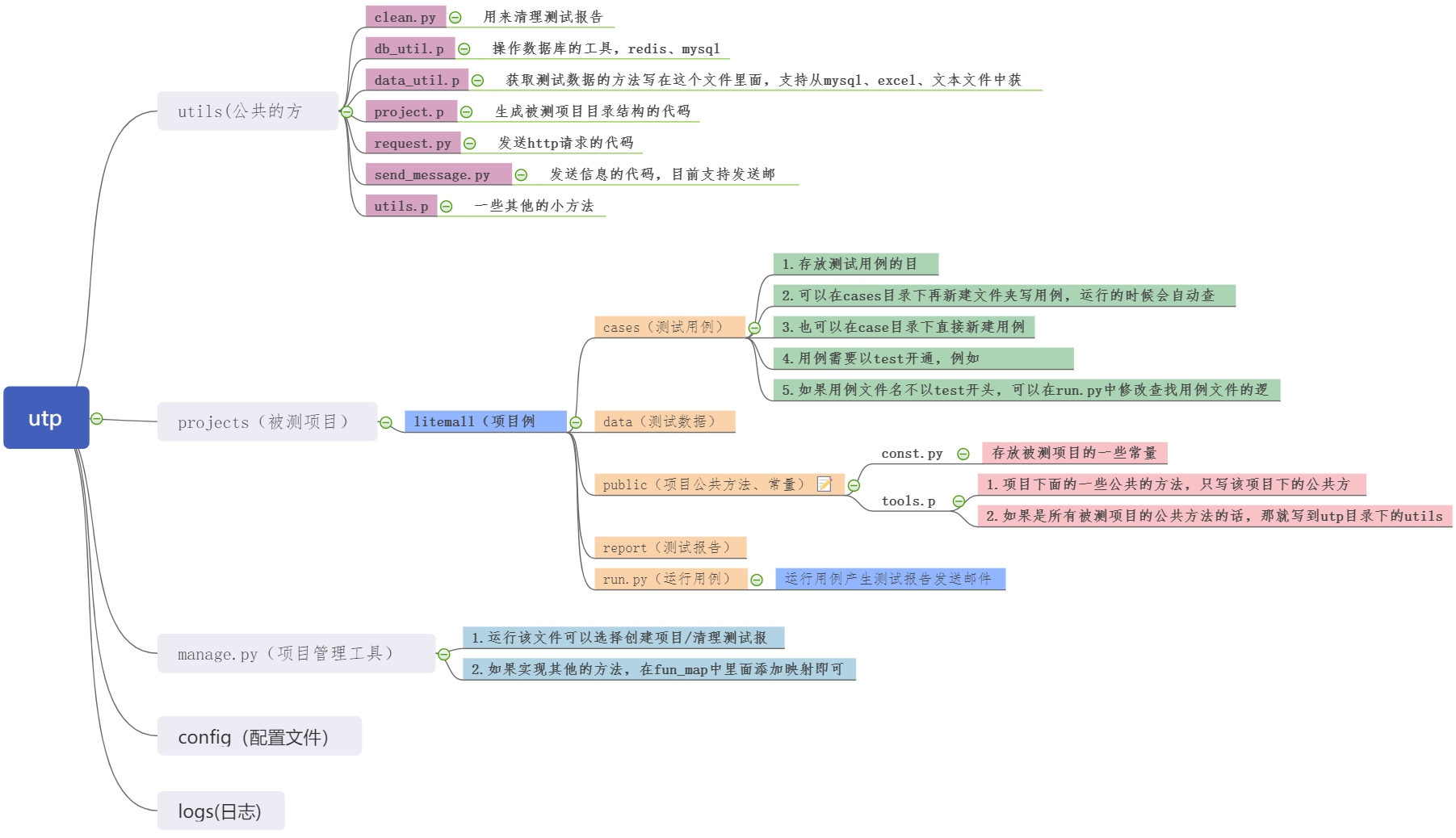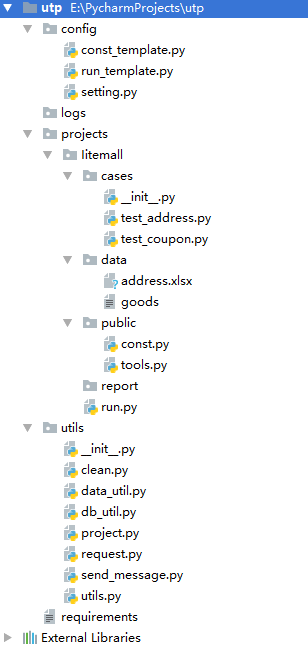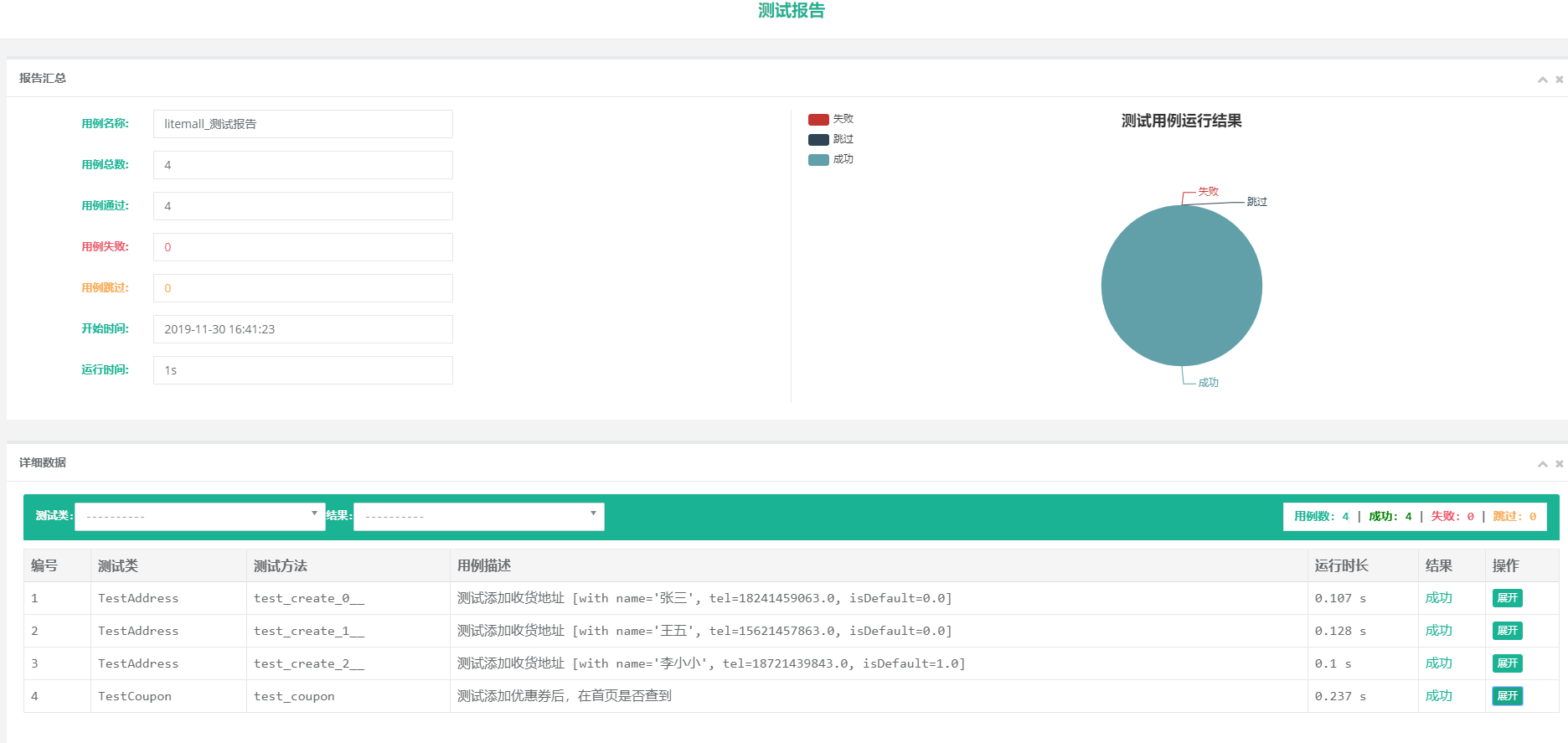python接口自动化框架
接口测框架

安装教程
- 需要3.5及以上版本的python
- pip install -r requirements.txt
使用说明
- 运行manage.py创建项目
- 创建的项目在projects目录下
- 在项目的cases目录下编写测试用例,可以参考litemall项目中如何编写测试用例
- 执行项目目录下的run.py运行所有测试用例

一、config配置文件
三个文件:
const_template.py
run_template.py
setting.py
文件代码:
const_template.py
import os host = 'http://ip:port' # 测试环境地址 project_path = os.path.dirname(os.path.dirname(os.path.abspath(__file__))) data_path = os.path.join(project_path, 'data') # 存测试数据的目录 report_path = os.path.join(project_path, 'report') # 存报告的目录 case_path = os.path.join(project_path, 'cases') # 存测试用例的目录
run_template.py
from utils.send_message import send_mail
from config.setting import email_template
from projects.Iitemall.public.const import case_path, report_path
import nnreport as bf
import datetime
import unittest
import os
import sys
root_dir = os.path.dirname(
os.path.dirname(
os.path.dirname(
os.path.abspath(__file__))))
# 项目根目录,加入环境变量,否则直接在命令行里面运行的时候有问题, 找不到其他的模块
sys.path.insert(0, root_dir)
def run():
test_suite = unittest.defaultTestLoader.discover(case_path, 'test*.py')
# 这里是指定找什么开头的.py文件,运行用例的时候可以自己改
report = bf.BeautifulReport(test_suite)
title = '{project_name}_测试报告'
filename = title + '_' + datetime.datetime.now().strftime('%Y%m%d%H%M%S') + '.html'
report.report(description=title,
filename=filename,
log_path=report_path)
email_content = email_template.format(pass_count=report.success_count,
fail_count=report.failure_count,
all_count=report.success_count + report.failure_count)
report_abs_path = os.path.join(report_path, filename)
send_mail(filename, email_content, report_abs_path)
if __name__ == '__main__':
run()
setting.py
import os
import nnlog
mysql_info = {
'default':
{
'host': 'ip',
'port': 3306,
'user': 'dbuser',
'password': 'dbpassword',
'db': 'db',
'charset': 'utf8',
}
} # 数据库配置,多个数据库,在字典里加key就可以了
redis_info = {
'default': {
'host': 'ip',
'port': 6379,
'db': 0,
'decode_responses': True
}
} # redis配置,多个数据库,在字典里加key就可以了
email_info = {
'host': 'smtp.163.com', #
'user': 'binzi_chen@163.com', # 用户
'password': '5tgb6yhn', # 密码
'port': 465,
}
email_to = ['binzichen@126.com']
email_cc = ['zibin.chen@mhp.com']
base_path = os.path.dirname(os.path.dirname(os.path.abspath(__file__)))
log_path = os.path.join(base_path, 'logs', 'utp.log') # 指定日志文件
projects_path = os.path.join(base_path, 'projects') # 项目目录
log = nnlog.Logger(log_path)
email_template = '''
各位好:
本次接口测试结果如下:总共运行{all_count}条用例,通过{pass_count}条,失败【{fail_count}】条。
详细信息请查看附件。
''' # 邮件模板
一、utils公共方法
该文件夹为python文件夹,需待__init__.py文件
七个文件:
clean.py
data_util.py
db_util.py
project.py
request.py
send_message.py
utils.py
文件代码:
clean.py
import os
import time
from config.setting import projects_path
def clean_report(days=10):
'''清理测试报告'''
for cur_dir, dirs, files in os.walk(projects_path): # 递归获取项目目录下所有文件夹
if cur_dir.endswith('report'): # 判断如果文件夹是report的话,获取文件夹下面的文件
for report in files:
if report.endswith('.html'): # 如果是.html结尾的
report_path = os.path.join(cur_dir, report)
if os.path.getctime(
report_path) < time.time() - 60 * 60 * 24 * days:
os.remove(report_path)
data_util.py
import os
import xlrd
from config.setting import log
from .db_util import get_mysql_connect
class GetTestData:
@staticmethod
def data_for_txt(file_name):
'''
从文本文件里面获取参数化数据
:param file_name: 文件名
:return:二维数组
'''
log.debug('开始读取参数化文件%s' % file_name)
if os.path.exists(file_name):
with open(file_name, encoding='utf-8') as fr:
data = []
for line in fr:
if line.strip():
line_data = line.strip().split(',')
data.append(line_data)
return data
log.error('%s参数化文件不存在' % file_name)
raise Exception('%s参数化文件不存在' % file_name)
@staticmethod
def data_for_excel(file_name, sheet_name=None):
'''
从excel里面读参数化数据
:param file_name: 文件名
:param sheet_name: sheet页名字,默认不写取第一个sheet页
:return: 二维数组
'''
log.debug('开始读取参数化文件%s' % file_name)
if os.path.exists(file_name):
data = []
book = xlrd.open_workbook(file_name)
if sheet_name:
sheet = book.sheet_by_name(sheet_name)
else:
sheet = book.sheet_by_index(0)
for row_num in range(1, sheet.nrows):
row_data = sheet.row_values(row_num)
data.append(row_data)
return data
log.error('%s参数化文件不存在' % file_name)
raise Exception('%s参数化文件不存在' % file_name)
@staticmethod
def data_for_mysql(sql, db_config='default'):
'''
从数据库里面获取测试数据
:param sql:sql语句
:param db_config:从配置文件里面配置的mysql信息
:return:从数据库里面查出来的二维数组
'''
mysql = get_mysql_connect(db_config)
return mysql.get_list_data(sql)
db_util.py
import pymysql
import redis
from config.setting import mysql_info, redis_info
class Mysql:
def __init__(self, host, user, password, db, port=3306, charset='utf8'):
# 构造函数,类在实例化的时候会自动执行构造函数
self.db_info = {'user': user, 'password': password, "db": db, "port": port, 'charset': charset,
'autocommit': True, 'host': host}
self.__connect()
def __del__(self):
self.__close()
def __connect(self):
try:
self.conn = pymysql.connect(**self.db_info) # 建立连接
except Exception as e:
raise Exception("连接不上数据库,请检查数据库连接信息")
else:
self.__set_cur() # 设置游标
def execute_many(self, sql):
self.cur.execute(sql)
return self.cur.fetchall()
def execute_one(self, sql):
self.cur.execute(sql)
return self.cur.fetchone()
def __set_cur(self, type=pymysql.cursors.DictCursor): # 设置游标,默认是字典类型
self.cur = self.conn.cursor(cursor=type)
def get_list_data(self, sql):
'''从数据库获取到的数据是list'''
self.__set_cur(type=None) # 设置游标为空,返回的就不是字典了
self.cur.execute(sql)
self.__set_cur() # 查完之后重新设置游标为字典类型
return self.cur.fetchall()
def __close(self):
self.conn.close()
self.cur.close()
def get_redis_connect(name='default'):
'''获取redis连接,如果不传name,获取默认的链接'''
redis_config = redis_info.get(name)
return redis.Redis(**redis_config)
def get_mysql_connect(name='default'):
'''获取mysql连接,如果不传name,获取默认的链接'''
mysql_config = mysql_info.get(name)
return Mysql(**mysql_config)
project.py
import os
class Project:
base_path = os.path.dirname(
os.path.dirname(
os.path.abspath(__file__))) # 工程目录
projects_path = os.path.join(base_path, 'projects') # 项目目录
child_dirs = ['cases', 'data', 'report', 'public']
def __init__(self, project_name):
self.project_name = project_name
self.project_path = os.path.join(
self.projects_path, project_name) # 要创建的项目目录
def create_project(self):
'''校验项目是否存在,不存在的话,创建'''
if os.path.exists(self.project_path):
raise Exception("项目已经存在!")
else:
os.mkdir(self.project_path)
def create_init_py(self, path):
'''
创建__init__.py文件
:param path: 路径
:return:
'''
py_file_path = os.path.join(path, '__init__.py')
self.write_content(py_file_path, '') # 打开一个空文件
def create_dir(self, ):
'''创建项目下面的子目录'''
for dir in self.child_dirs:
dir_path = os.path.join(self.project_path, dir)
os.mkdir(dir_path)
if dir == 'cases': # 如果是cases文件夹的话,创建__init__.py
# cases是个package查找用例的时候才会找到那个目录下所有子目录里面的测试用例
self.create_init_py(dir_path)
def create_run_py(self):
'''生成run.py'''
run_template_path = os.path.join(
self.base_path, 'config', 'run_template')
content = self.get_template_content(
run_template_path).format(project_name=self.project_name)
run_file_path = os.path.join(self.project_path, 'run.py')
self.write_content(run_file_path, content)
def create_const_py(self):
'''生成const.py'''
run_template_path = os.path.join(
self.base_path, 'config', 'const_template')
content = self.get_template_content(run_template_path)
run_file_path = os.path.join(self.project_path, 'public', 'const.py')
self.write_content(run_file_path, content)
def main(self):
'''创建项目'''
self.create_project() # 创建项目
self.create_dir() # 创建项目下面的文件夹
self.create_run_py() # 创建run.py
self.create_const_py() # 创建const.py
@staticmethod
def get_template_content(file_name):
'''读取文件内容'''
with open(file_name, encoding='utf-8') as fr:
return fr.read()
@staticmethod
def write_content(file, content):
'''写入文件'''
with open(file, 'w', encoding='utf-8') as fw:
fw.write(content)
request.py
import requests
# 反射
class MyRequest:
def __init__(self, url, method='get', data=None,
headers=None, is_json=True):
method = method.lower()
self.url = url
self.data = data
self.headers = headers
self.is_json = is_json
if hasattr(self, method):
getattr(self, method)()
def get(self):
try:
req = requests.get(
self.url,
self.data,
headers=self.headers).json()
except Exception as e:
self.response = {"error": "接口请求出错%s" % e}
else:
self.response = req
def post(self):
try:
if self.is_json:
req = requests.post(
self.url,
json=self.data,
headers=self.headers).json()
else:
req = requests.post(
self.url, self.data, headers=self.headers).json()
except Exception as e:
self.response = {"error": "接口请求出错%s" % e}
else:
self.response = req
send_message.py
import yamail
import traceback
from config.setting import email_info, email_cc, email_to, log
def send_mail(subject, content, files=None):
'''
发送邮件
:param subject:主题
:param content: 内容
:param files: 附件
:return:
'''
try:
smtp = yamail.SMTP(**email_info)
smtp.send(subject=subject, contents=content,
to=email_to, cc=email_cc, attachments=files)
except Exception as e:
log.error("发送邮件失败+%s" % traceback.format_exc())
def send_sms():
'''
发送短信验证码
:return:
'''
pass
utils.py
import jsonpath
def get_value(dic, key):
'''
这个函数是从一个字典里面,根据key获取vlaue
:param dic:传一个字典
:param key:传一个
:return:如果有,返回key取到value,如果key没有,返回空字符串
'''
result = jsonpath.jsonpath(dic, '$..%s' % key)
if result:
return result[0]
return ''
三、 Projects项目模块(litemall项目)
四个文件夹和一个python文件:
cases(python文件夹)
test_address.py
test_coupon.py
data (存放测试数据)
address.xlsx
goods.txt
public
const.py (存放测试常量)
tools.py
report
run.py
文件代码:
test_address.py
import unittest
import parameterized
import os
from urllib.parse import urljoin
from projects.litemall.public.const import host, test_user, data_path
from projects.litemall.public import tools
from utils.request import MyRequest
from utils.db_util import get_mysql_connect
from utils.data_util import GetTestData
address_data_path = os.path.join(data_path, 'address.xlsx') # 拼接测试数据文件的路径
test_address_data = GetTestData.data_for_excel(address_data_path) # 获取参数化使用的数据
class TestAddress(unittest.TestCase):
url = urljoin(host, '/wx/address/save')
@classmethod
def setUpClass(cls):
# cls.mysql = get_mysql_connect() # 获取mysql连接
token = tools.WxLogin(**test_user).get_token() # 登录获取token
cls.header = {'X-Litemall-Token': token} # 拼header
@parameterized.parameterized.expand(test_address_data) # 参数化
def test_create(self, name, tel, isDefault):
'''测试添加收货地址'''
is_default = True ' else False
data = {
"name": name,
"tel": "%d" % tel,
"country": "",
"province": "北京市",
"city": "市辖区",
"county": "东城区",
",
"postalCode": "",
"addressDetail": "西二旗",
"isDefault": is_default
}
req = MyRequest(
self.url,
'post',
data=data,
headers=self.header) # 发请求
self.assertEqual(0, req.response.get('errno'), msg='添加失败') # 校验错误码是否为0
address_id = req.response.get('data')
# sql = 'select name from litemall_address where id = %s;' % address_id
# db_data = self.mysql.execute_one(sql)
# self.assertIsNotNone(db_data, msg='litemall:查询地址不存在')#校验是否从数据库查到数据
# self.assertEqual(db_data.get('name'), name) #判断数据库存的名字和添加的名字是否一样
test_coupon.py
import unittest
from urllib.parse import urljoin
from projects.Iitemall.public.const import host, test_admin_user
from projects.Iitemall.public import tools
from utils.request import MyRequest
from utils.utils import get_value
class TestCoupon(unittest.TestCase):
@classmethod
def setUpClass(cls):
token = tools.AdminLogin(**test_admin_user).get_token() # 登录获取token
cls.header = {'X-Litemall-Admin-Token': token} # 拼header
def add_coupon(self):
url = urljoin(host, '/admin/coupon/create')
name = 'Python自动化测试优惠券'
data = {
"name": name,
"desc": "介绍",
",
",
",
"limit": 1,
"type": 0,
"status": 0,
"goodsType": 0,
"goodsValue": [],
"timeType": 0,
",
"startTime": None,
"endTime": None
}
req = MyRequest(url, 'post', data=data, headers=self.header)
print(req.response)
self.assertEqual(0, req.response.get('errno'), msg='添加失败')
coupon_id = get_value(req.response, 'id')
return name, coupon_id
def test_coupon(self):
'''测试添加优惠券后,在首页是否查到'''
url = urljoin(host, '/wx/coupon/list')
name, id = self.add_coupon() # 添加优惠券
req = MyRequest(url)
coupon_list = get_value(req.response, 'list')
tag = False
for coupon in coupon_list:
if name == coupon.get('name') and coupon.get('id') == id:
tag = True
break
self.assertTrue(tag, msg='添加的优惠券查不到')
const.py
import os
host = 'http://proxy.nnzhp.cn'
test_user = {
'username': 'user123',
'password': 'user123'
} # 测试用户
test_admin_user = {
'username': 'admin123',
'password': 'admin123'
} # 测试用户
project_path = os.path.dirname(os.path.dirname(os.path.abspath(__file__)))
data_path = os.path.join(project_path, 'data') # 存测试数据的目录
report_path = os.path.join(project_path, 'report') # 存报告的目录
case_path = os.path.join(project_path, 'cases') # 存测试用例的目录
tools.py
from utils.utils import get_value
from utils.request import MyRequest
from config.setting import log
from urllib import parse
from .const import host
class AdminLogin:
'''admin登录'''
url = parse.urljoin(host, '/admin/auth/login') # 拼接url
def __init__(self, username, password):
self.username = username
self.password = password
def get_token(self):
data = {'username': self.username, 'password': self.password}
req = MyRequest(self.url, 'post', data=data, is_json=True)
token = get_value(req.response, 'token')
log.debug("登录的返回结果,%s" % req.response)
if token:
return token
log.error('litemall:登录失败' % req.response)
raise Exception('登录失败,错误信息%s' % req.response)
class WxLogin(AdminLogin):
'''Wx登录'''
url = parse.urljoin(host, '/wx/auth/login')
run.py
import unittest
import datetime
import os
import nnreport
from projects.Iitemall.public.const import case_path, report_path
from config.setting import email_template
from utils.send_message import send_mail
def run():
test_suite = unittest.defaultTestLoader.discover(case_path, 'test*.py')
# 这里是指定找什么开头的.py文件,运行用例的时候可以自己改
report = nnreport.BeautifulReport(test_suite)
title = 'litemall_测试报告'
filename = title + '_' + datetime.datetime.now().strftime('%Y%m%d%H%M%S') + '.html'
report.report(description=title,
filename=filename,
log_path=report_path)
email_content = email_template.format(pass_count=report.success_count,
fail_count=report.failure_count,
all_count=report.success_count + report.failure_count)
report_abs_path = os.path.join(report_path, filename)
send_mail(filename, email_content, report_abs_path)
if __name__ == '__main__':
run()

四、必装第三方模块
requirement.txt
nnreport pymysql yamail requests jsonpath nnlog xlrd redis parameterized
python接口自动化框架的更多相关文章
- python接口自动化框架搭建
一.在搭建接口自动化测试框架前,我觉得先需要想明白以下几点: ① 目前情况下,绝大部分接口协议是http,所以需要对http协议有个基本的了解,如:http协议请求.响应由哪些部分组成,常用的meth ...
- 【python接口自动化框架-unittest】【一】unittest单元测试框架概念
一.unittst单元测试框架 概念参考:https://docs.python.org/2/library/unittest.html 使用方法:import unittest (引入unittes ...
- 【python接口自动化框架-unittest】如何传参数到下一个case
1.前提 平时我们用unittest的时候,都知道每个test_ 都是相互独立的,但是很多现实情况是,我们下一个接口参数,可能会用到上一个接口返回的json字段,那么,我们怎么去实现呢 2.实例 1. ...
- python3+request接口自动化框架
首次书写博客,记录下写的自动化接口框架,框架比较简单,哈哈哈,算是记录下历程把!~~~ 一.本次框架由python3.6 书写 1.准备代码环境,下载python3.6 下载地址:https:/ ...
- python+request接口自动化框架
python+request接口自动化框架搭建 1.数据准备2.用python获取Excel文件中测试用例数据3.通过requests测试接口4.根据接口返回的code值和Excel对比 但本章只讲整 ...
- 转载:python + requests实现的接口自动化框架详细教程
转自https://my.oschina.net/u/3041656/blog/820023 摘要: python + requests实现的接口自动化框架详细教程 前段时间由于公司测试方向的转型,由 ...
- python接口自动化28-requests-html爬虫框架
前言 requests库的好,只有用过的人才知道,最近这个库的作者又出了一个好用的爬虫框架requests-html.之前解析html页面用过了lxml和bs4, requests-html集成了一些 ...
- python接口自动化24-有token的接口项目使用unittest框架设计
获取token 在做接口自动化的时候,经常会遇到多个用例需要用同一个参数token,并且这些测试用例跨.py脚本了. 一般token只需要获取一次就行了,然后其它使用unittest框架的测试用例全部 ...
- python + requests实现的接口自动化框架详细教程
前段时间由于公司测试方向的转型,由原来的web页面功能测试转变成接口测试,之前大多都是手工进行,利用postman和jmeter进行的接口测试,后来,组内有人讲原先web自动化的测试框架移驾成接口的自 ...
随机推荐
- 使用Django创建RESTful API
Agenda 1.What is an api Api refers to application programming interface It is a set of subroutine de ...
- redis在项目中的应用
redis在项目中的应用 ps:PHP 会自动 关redis连接 不需要手动关 对于临时的数据 可以不经过数据库直接redis上操作<pre>/*消息队列实例 消息队列详细步骤在http ...
- Java 微信支付分对接记录 (先享后付)
微信支付分(先享后付)对接记录: 微信支付分对接步骤 填写开通支付分的申请表格 此步骤大概需要审核 1-3 个工作日; (模板-服务信息配置表-[先享后付免确认]-[商户名].xls) 填写商户信息 ...
- [转帖]银河麒麟Kydroid 2.0全新发布:原生支持海量安卓APP
银河麒麟Kydroid 2.0全新发布:原生支持海量安卓APP https://news.cnblogs.com/n/652299/将手机操作系统 转移到 桌面 跟chromebook 类似的策略吧 ...
- 使用spring jpa hibernate框架时报错:javax.validation.UnexpectedTypeException: HV000030
错误信息: [#%&*^]20190521121942:497.!react:all.,RctJobExecutor-1#D9AA5167921A464CA9DDA14943545426%NA ...
- 汉字转拼音,TinyPinyin、Pinyin4j与JPinyin哪个库更快
1. 介绍 本文对TinyPinyin.Pinyin4j与JPinyin三个汉字转拼音库的用法.测试代码及转换的结果做一个简单的总结. TinyPinyin 适用于Java和Android的快速.低内 ...
- 【linux】Too many open files 解决问题第一步【记录】
记录一下解决linux上出现:Too many open files 的第一步骤. 做个记录,免得每次都查来查去的. 1.查看 ulimit -a 2.修改 vi /etc/security/lim ...
- System.Windows.Forms.Control.CheckForIllegalCrossThreadCalls = false
多线程程序中,新创建的线程不能访问UI线程创建的窗口控件,这时如果想要访问窗口的控件,发现无法对其控制. 这时可将窗口构造函数中的CheckForIllegalCrossThreadCalls设置为f ...
- 私钥、公钥与https
HTTP的安全缺陷 通信内容不加密,导致被窃听 不验证客户端和服务端的身份,导致: 服务器伪装 响应返回到了其他的客户端 海量恶意连接 无法证明报文的完整性,导致:请求和响应内容被篡改,这称为中间人攻 ...
- Go语言(golang)新发布的1.13中的Error Wrapping深度分析
Go 1.13发布的功能还有一个值得深入研究的,就是对Error的增强,也是今天我们要分析的 Error Wrapping. 背景 做Go语言开发的,肯定经常用error,但是我们也知道error非常 ...
